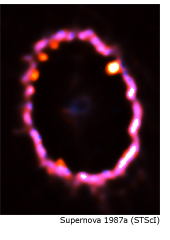|
|
| AST 309N · Lives and Deaths of the Stars |
 1
2
3
4
1
2
3
4

|
Writing Component Aspect
This section of Ast 309N satisfies the requirement for a lower-division course with a substantial writing component (SWC). While the
primary goal of this course is to gain an understanding of the subject matter, the second goal is to develop your writing skills. As a result,
most of the required work will be in the form of writing assignments rather than problem sets, and the exams, including the optional final
exam, will be in essay format. If you would prefer a larger section with multiple-choice tests,and no emphasis on writing, you should
consider taking an alternate Ast 309 class. (For example, Dr. Wheeler's section of Ast 309N, which meets MWF at 11 AM, is similar, though
not identical, in content.)
 Reason for the Writing Component
Reason for the Writing Component
Does it surprise you that there is an astronomy course with a substantial writing component? It shouldn't! Good writing means effective
communication, on paper or the equivalent. The ability to express oneself clearly and succinctly is important for almost any career. In
addition, having to write about something forces you to confront what you do and don't understand. It is often said that you learn something
best when you have to explain it to someone else. In this course we will use the writing assignments to focus your understanding of the
material as well as to develop writing skills.
Assignments and Course Grades
The required work and basis for your course grade will consist of:
- Four in-class hour exams, 15% each, the best three count; total = 45%
(I do not give make-up exams. However, if you have a serious problem
that causes you to miss an exam, or interferes with your performance,
you have the option of taking a comprehensive final exam at the official
final time, Wed. May 12, 9 AM - noon, to replace one exam grade.)
- Various writing assignments, including two medium-length term papers
Term papers (5 - 6 typed pages each): each 15 %; total = 30%
Shorter writing assignments (abstracts, critiques, etc.): total = 15%
- Class participation: 10%
Policies
The grading of assignments is most efficient and even-handed when all papers are graded at the same time. For this as well as for logistical
reasons, all assignments must be handed in on time. Late papers will be graded down by one full letter grade for each two days of lateness;
after one week the assignment will no longer be accepted. Assignments should be prepared with a printer that provides good legibility,
using double-spacing and reasonable margins (to provide room for instructor feedback), and be printed on standard letter-sized paper.
Choose a font that is clear and of large enough size to be readable (usually 11-point or larger).
Getting Help
Naturally, we expect that the writing you turn in is your own (see below). However, if you need it, you are welcome to seek appropriate
help from various sources, including consulting the professor or TA for additional feedback and advice on approaching an assignment,
and use of campus resources such as UT's Undergraduate Writing Center (more information to be distributed in class).
|
|
|
|

 Reason for the Writing Component
Reason for the Writing Component